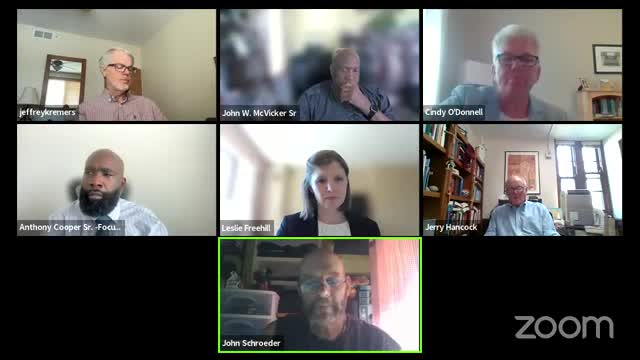Former Felon Turns Tragedy into Community Empowerment

This article was created by AI summarizing key points discussed. AI makes mistakes, so for full details and context, please refer to the video of the full meeting. Please report any errors so we can fix them. Report an error »

During a recent government meeting, two individuals shared their compelling stories as they sought pardons for past felonies, highlighting the challenges faced by those with criminal records in reintegrating into society.
The first speaker, Mr. Schroeder, detailed his struggles stemming from a felony conviction that has lingered for 17 years. He expressed a desire for a pardon to alleviate the stigma associated with his past, which has made securing housing increasingly difficult. Currently residing in a home owned by a friend, he fears potential homelessness if the homeowner faces financial issues. Mr. Schroeder credited a free legal clinic in Milwaukee for guiding him through the pardon application process, emphasizing the importance of support systems for individuals with criminal histories.
The board inquired about his outstanding restitution, revealing that he still owes approximately $57,100. Mr. Schroeder admitted to making some payments but noted that the billing had become irrelevant long before he was on probation, indicating a lack of follow-up on the matter.
Following Mr. Schroeder, Jackie Pierre recounted his journey from incarceration to community service. Convicted in 1995 for robbery, he spent four years in prison, during which he engaged in various rehabilitation programs. Upon release, he quickly found employment and eventually started his own flooring business. Mr. Pierre has since expanded his efforts to include a cleaning service that employs other former felons and a nonprofit organization aimed at supporting families affected by violence, inspired by the tragic loss of his son in a car accident.
Mr. Pierre's initiative, the Our Shining Star Foundation, seeks to provide apprenticeship programs and support for youth, addressing the decline in skilled trades education. He expressed a commitment to turning his personal tragedy into a source of motivation for community improvement, aiming to become a grief counselor to help others navigate similar experiences.
Both testimonies underscored the ongoing challenges faced by individuals with felony records and the critical role of community support in fostering rehabilitation and reintegration. The board's engagement with these narratives reflects a broader societal conversation about justice, redemption, and the potential for second chances.
The first speaker, Mr. Schroeder, detailed his struggles stemming from a felony conviction that has lingered for 17 years. He expressed a desire for a pardon to alleviate the stigma associated with his past, which has made securing housing increasingly difficult. Currently residing in a home owned by a friend, he fears potential homelessness if the homeowner faces financial issues. Mr. Schroeder credited a free legal clinic in Milwaukee for guiding him through the pardon application process, emphasizing the importance of support systems for individuals with criminal histories.
The board inquired about his outstanding restitution, revealing that he still owes approximately $57,100. Mr. Schroeder admitted to making some payments but noted that the billing had become irrelevant long before he was on probation, indicating a lack of follow-up on the matter.
Following Mr. Schroeder, Jackie Pierre recounted his journey from incarceration to community service. Convicted in 1995 for robbery, he spent four years in prison, during which he engaged in various rehabilitation programs. Upon release, he quickly found employment and eventually started his own flooring business. Mr. Pierre has since expanded his efforts to include a cleaning service that employs other former felons and a nonprofit organization aimed at supporting families affected by violence, inspired by the tragic loss of his son in a car accident.
Mr. Pierre's initiative, the Our Shining Star Foundation, seeks to provide apprenticeship programs and support for youth, addressing the decline in skilled trades education. He expressed a commitment to turning his personal tragedy into a source of motivation for community improvement, aiming to become a grief counselor to help others navigate similar experiences.
Both testimonies underscored the ongoing challenges faced by individuals with felony records and the critical role of community support in fostering rehabilitation and reintegration. The board's engagement with these narratives reflects a broader societal conversation about justice, redemption, and the potential for second chances.
View full meeting
This article is based on a recent meeting—watch the full video and explore the complete transcript for deeper insights into the discussion.
View full meeting